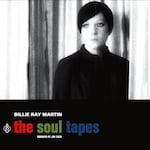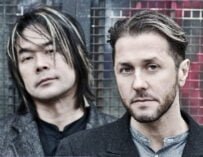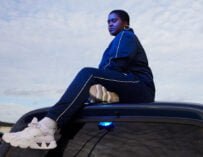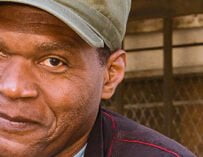
Billie Ray Martin. Pic: Mary Rouge.
She’s worked with a Who’s Who of dance music, but now she’s releasing a soul album with a country twist
Some readers may be surprised to see Billie Ray Martin featuring here. After all, she’s most readily associated with electronic music, having first made her name as the singer with UK house outfit Electribe 101 (and as a guest vocalist for S-Express) in the late 80s. Since those days, she’s released a string of club classics under her own name (most notably the 1995 hit Your Loving Arms), as well as working with a long line of DJ/producers including DJ Hell, Slam, Hard Ton and Hercules & Love Affair.
But she’s always described herself as “a soul singer who ended up making electronic music”, and her 2000 album 18-Carat Garbage saw her working in Memphis with soul legends Ann Peebles, Carla Thomas and members of Aretha Franklin’s backing band. And now, with her new album The Soul Tapes, she’s gone one step further.
The album is entirely organic, with no electronic instruments used at all, and was produced by (and co-written with) Jon Tiven, whose credits include the likes of Waylon Jennings, BB King, Wilson Pickett, Lucinda Williams, Alex Chilton, Bobby Womack and Willie Nelson. Perhaps unsurprisingly, given that pedigree, there’s a strong country flavour to The Soul Tapes‘ particular brand of soul music.
There’s an interesting back story, too. The songs were actually recorded back in the late 90s, prior to 18-Carat Garbage, but for various reasons the album was put on hold for a while. Then in 2014, Billie returned to the US and, alongside Tiven, completely reworked the original recordings to make them sound contemporary, production-wise.
The result is an album that’s likely to win her many new fans, and that showcases her songwriting ability more clearly than ever. Intrigued, we got her on the phone to find out more…
 The album’s a bit of a departure from the sound you’re known for, but then you’ve described yourself in the past as a soul singer who “ended up” making electronic music. Does this feel, then, like the album you always wanted to make?
The album’s a bit of a departure from the sound you’re known for, but then you’ve described yourself in the past as a soul singer who “ended up” making electronic music. Does this feel, then, like the album you always wanted to make?
“No, it’s just one album that I made. And it’s great.”
Tell us about the writing of the album… were the songs mostly written collaboratively?
“They were written by me, Jon Tiven and Sally Tiven, except the two cover versions, one of which was written by Ann Peebles and then there’s a cover version of That’s How Strong My Love Is as well.”
Did you write the songs before going in the studio, or were they worked up in the studio?
“Before. Jon and Sally are such good writers – they’re all about song structure, because they’re country, soul and blues writers. So they sent me a bunch of ideas on a CD, or it might even have been a cassette at the time, and all the songs were okay for me, in terms of the chord structures and so on.
“Normally I don’t just take something and write the song on top, but in this case, because they’re such good writers, it took no time at all to write the melodies and the lyrics, and I didn’t need to ask for any changes as far as structure goes. It was easy, so yes, they were all written before we went in. But then we had different ideas about producing them, so that needed a bit of tweaking once we were in the studio.”
And is that different from how you wrote with Electribe 101, or for your solo work?
“Yes, because when you do electronic music… well, it really depends who you’re working with, but I’m a songwriter, so there’s always a verse-bridge-chorus, which sometimes can be unusual for electronic music. When people understand that, we have a much easier time writing a song that’s hopefully good!
“When that doesn’t happen I go back a lot of times, explaining what it is I need, suggesting chord changes, changes in the production. I tell them about structure and arrangement. Not everybody in electronic music knows about that, or wants to know about that.
“So I tend to end up working with people that do – people that really want what I do. Because some people say they want what I do, but when I tell them I want to write a song, they say they don’t want a song! So I tend now to not bother unless it’s someone who wants what I can provide – which is a song.
“I’m also much more involved with production, in the electronic stuff… but then I was also with Jon Tiven. Jon and I ended up producing the album together because I have such strong ideas about how it should all sound. So it was different and not different, in that sense.”
“My publisher used to say my songs were soul songs put to electronic music”
How did you come to hook up with Jon and Sally in the first place?
“Jon and Sally were introduced to me back in the 90s by our publisher at the time, Warner Chappell. Warner Chappell always used to say my songs were like country and soul songs put to electronic music, so they just said, ‘There’s this guy Jon Tiven, you two would get along like a house on fire.’ And we did!”
It’s interesting that you mention country, because to our ears there’s definitely a strong country-soul feel to the album. Would you agree?
“Well, a couple of the songs, yes. But the rest of the album is influenced very obviously by Hi Records, and that’s straight soul, I’d say.”
Do you listen to much country music?
“No, not at all.”
So where does that country twang come from, do you think?
“I don’t know. Inside of me, I guess.”
Simon Kirke of Free and Bad Company drums on the album… how did that come about?
“Simon is someone that Jon brought in. They’re friends and they’ve worked together a lot of times before. It’s funny – when I sent Jon the mixes back of the album, he said, ‘Wow, we’re lucky Simon’s such a good drummer!’, because we put the drums right up front. I was going for that Hi Records sound, and on those records the drums were always really up front.”

A still from Billie’s video for the song ‘On Borrowed Time’
So with the album taking a while to come to fruition… is it a case of “I’ve ticked that box now, on to the next thing”? Or is this is the start of a whole new era for Billie Ray Martin?
“It’s the first one.”
So you’ll be concentrating more on electronic music again, going forward?
“Yes, I think I’ll record a house album next. I’ve been talking to some people but nothing’s been confirmed yet, so best not to mention any names. There’s also a plan to re-release some of the Electribe 101 stuff, which I’m talking to labels about, but again nothing’s confirmed yet. It all takes a lot of organising.”
You mentioned the way you write with electronic producers… do you always write for a particular project, then?
“Yes. I’m not someone who keeps a book full of lyric ideas… I might write down the odd idea, but I don’t sit at home and write. I think I’m much too lazy for that. But the minute I start working with someone, it comes out fresh… whatever is in me, that I don’t even know is there, something I might have experienced, perhaps. It will all just come out and happen right there and then. Which is sometimes weird, because it’s a bit scary – what if nothing will happen? But more often than not something does. So that’s how I do it.
“Having said that, there’s a semi-electronic project I’m still preparing, which is about Oscar Wilde’s last days in Paris, the weeks and months leading up to his death. And for that I suddenly, about three or four months ago now, just sat down and wrote all these words, pages and pages of them pouring out of me. That was really the first time where I ended up taking my ideas to people, because it’s supposed to be a play. A play put to music, but it’s not going to be on for a while.
“That was the first time where, suddenly, I had to write something down. They were actually more like poems, and I’ve never written poems so it was very weird that the songs started to come out in this format. I really look forward to seeing what’s going to happen with it, which I don’t know at this point.”
So that could be the start of a whole new way of working for you?
“Maybe, maybe, yeah. I wish I was more spontaneous like that, but usually I just go blank! And then once someone says, ‘Hey, let’s write a song,’ I go ‘Okay’ and then I come out with ideas.”
“It would be weird for me to give someone half a song”
Have there been times when it hasn’t worked?
“No, something will happen eventually. The way I work, when I’m physically with people in the same room, is quite weird, because I come out with the finished song. I don’t stand in front of the mic and jam, and come out with ideas and lines, I just sort of listen to what they’re doing, and I might say, ‘Can you change that chord?” or ‘Can you make that eight bars instead of four?’. And people don’t know why I’m asking, but it’s all happening in my head, and then I’ll eventually go ‘Right, I’m ready to record, I’ve got the song’.
“I write it all down and hand it over when it’s ready. As a songwriter it would be weird for me to give someone half a song, or just a verse, because it all happens at the same time in my head. So on a couple of occasions, friends I’m working with have said to me, ‘This is bizarre, you’re just looking at us, not coming up with anything, and then suddenly you say, “I’m done”!’. So it’s quite unique, I think.”
You mentioned how Warner put you together with Jon and Sally in the 90s. These days, of course, major labels tend to want artists to work with their in-house songwriting teams…
“Do they? I don’t know, I’m not on a major label any more!”
We believe that’s often the case, yes. So how would you feel if a label said to you, we want to record a Billie Ray Martin album but we want you to work with this team of songwriters in Stockholm and these guys in Italy? Is it important to you that all your songs are written by you?
“Oh God, yes. To be honest, though, I don’t think any label would ask me to sing someone else’s words, because they’re usually quite happy when someone does write!
“I think if I was approached by a major label – and this has happened in the past – it’s more likely that they’d want me to work with a certain production team, and then it’s a case of, will the producer get what I’m about? But they’re usually happy for me to write the songs.”
Interview: Russell Deeks
The Soul Tapes is out now on Sonnenstahl Records. You can catch Billie Ray Martin playing live at The Jazz Cafe, London on 20 May.


































Related Articles